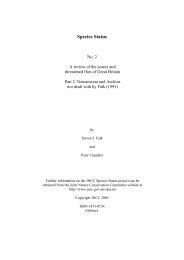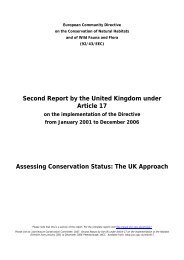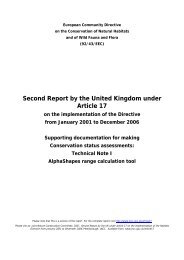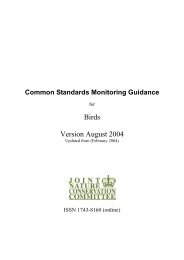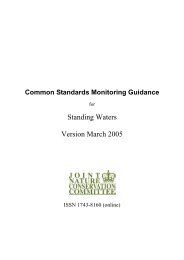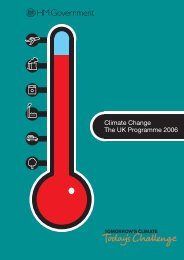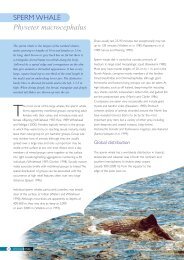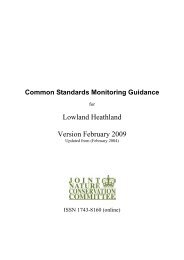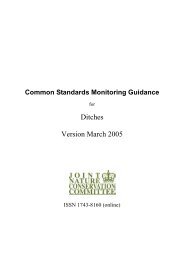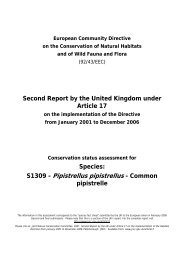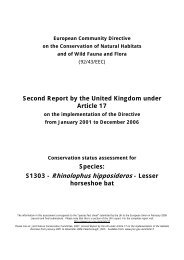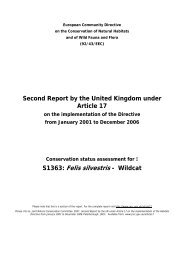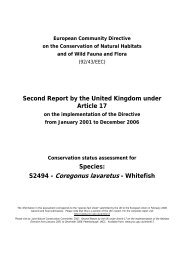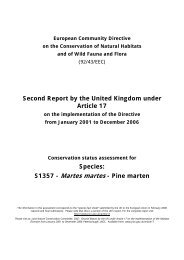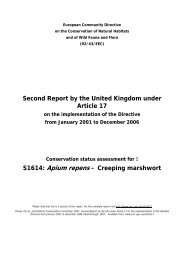Climate change in the UKOTs an overview of the ... - JNCC - Defra
Climate change in the UKOTs an overview of the ... - JNCC - Defra
Climate change in the UKOTs an overview of the ... - JNCC - Defra
You also want an ePaper? Increase the reach of your titles
YUMPU automatically turns print PDFs into web optimized ePapers that Google loves.
42<br />
Box 6. Three temperature <strong>in</strong>crease scenarios<br />
It is a foregone conclusion that <strong>the</strong> Earth’s temperature will cont<strong>in</strong>ue to rise for some<br />
time to come. What is not known is <strong>the</strong> extent <strong>of</strong> <strong>the</strong> <strong>ch<strong>an</strong>ge</strong> that will take place. <strong>Climate</strong><br />
scientists have modeled different scenarios <strong>of</strong> me<strong>an</strong> temperature <strong>ch<strong>an</strong>ge</strong>s with a view to<br />
predict<strong>in</strong>g what some <strong>of</strong> <strong>the</strong> likely impacts <strong>of</strong> temperature <strong>ch<strong>an</strong>ge</strong>s would be.<br />
Global me<strong>an</strong> temperature <strong>ch<strong>an</strong>ge</strong>s <strong>of</strong> up to 1.5°C would exacerbate current key vulnerabilities<br />
<strong>an</strong>d cause o<strong>the</strong>rs, such as negative health effects caused by heat waves, floods <strong>an</strong><br />
droughts, as well as malnutrition <strong>an</strong>d <strong>in</strong>fectious diseases, millions more people exposed to<br />
<strong>in</strong>creased water stress, <strong>in</strong>creased damage from storms <strong>an</strong>d floods, <strong>in</strong>creased coral bleach<strong>in</strong>g.<br />
Global me<strong>an</strong> temperature <strong>ch<strong>an</strong>ge</strong>s <strong>of</strong> 1.5°C to 3.5°C would result <strong>in</strong> <strong>an</strong> <strong>in</strong>creas<strong>in</strong>g number<br />
<strong>of</strong> key impacts at all scales, such as m<strong>an</strong>y million more people at risk from coastal<br />
flood<strong>in</strong>g, widespread loss <strong>of</strong> biodiversity, <strong>an</strong>d commitment to widespread melt<strong>in</strong>g <strong>of</strong> <strong>the</strong><br />
Greenl<strong>an</strong>d <strong>an</strong>d West Antarctic ice sheets with associated sea level rise.<br />
Global me<strong>an</strong> temperature <strong>ch<strong>an</strong>ge</strong>s greater th<strong>an</strong> 3.5°C would exceed <strong>the</strong> capacity <strong>of</strong> all<br />
systems - physical, biological <strong>an</strong>d social, <strong>in</strong> particular <strong>of</strong> hum<strong>an</strong> societies - to adapt to this<br />
extent <strong>of</strong> warm<strong>in</strong>g, especially s<strong>in</strong>ce it c<strong>an</strong> be even more pronounced regionally. As examples,<br />
about 30% loss <strong>of</strong> global coastal wetl<strong>an</strong>ds <strong>an</strong>d widespread mortality <strong>of</strong> corals.<br />
Need for action <strong>in</strong> <strong>the</strong> <strong>UKOTs</strong><br />
Based on <strong>the</strong> data <strong>an</strong>d <strong>in</strong>formation that are<br />
available (some <strong>of</strong> which is summarised<br />
below), climate <strong>ch<strong>an</strong>ge</strong> is already affect<strong>in</strong>g<br />
<strong>UKOTs</strong>. The IPCC projects that, even <strong>in</strong> <strong>the</strong><br />
best possible scenario, <strong>the</strong> effects <strong>of</strong> climate<br />
<strong>ch<strong>an</strong>ge</strong> will worsen before <strong>the</strong> situation<br />
improves. <strong>UKOTs</strong> have no control over<br />
<strong>the</strong> storm surges that affect <strong>the</strong>ir shores,<br />
nor c<strong>an</strong> <strong>the</strong>y regulate <strong>the</strong> <strong>in</strong>creas<strong>in</strong>g oce<strong>an</strong><br />
temperatures that affect <strong>the</strong>ir coral reefs or<br />
fish <strong>an</strong>d mar<strong>in</strong>e <strong>an</strong>imals <strong>in</strong> <strong>the</strong>ir waters, but<br />
what <strong>the</strong>y c<strong>an</strong> do is pl<strong>an</strong> for <strong>the</strong>se threats<br />
<strong>an</strong>d put <strong>in</strong> place systems <strong>an</strong>d <strong>in</strong>frastructure<br />
to reduce risk <strong>an</strong>d build resilience.<br />
<strong>UKOTs</strong> c<strong>an</strong>not afford to adopt a wait <strong>an</strong>d<br />
see attitude. The economies <strong>of</strong> <strong>the</strong> territories<br />
are too small <strong>an</strong>d <strong>the</strong>y are too<br />
dependent on sensitive ecosystems. If<br />
<strong>the</strong>y are completely unprepared, <strong>the</strong><br />
external shocks <strong>of</strong> some climate <strong>ch<strong>an</strong>ge</strong><br />
impacts could be devastat<strong>in</strong>g. In <strong>the</strong> most<br />
extreme circumst<strong>an</strong>ces, some <strong>UKOTs</strong><br />
Source: Germ<strong>an</strong> Federal M<strong>in</strong>istry for <strong>the</strong> Environment, Nature Conservation<br />
<strong>an</strong>d Nuclear Safety et al., 2007<br />
could lose l<strong>an</strong>d because <strong>of</strong> ris<strong>in</strong>g sea<br />
levels. Even without <strong>the</strong> most extreme scenario<br />
becom<strong>in</strong>g reality, what’s at stake for<br />
most territories is a way <strong>of</strong> life <strong>an</strong>d m<strong>an</strong>y <strong>of</strong><br />
<strong>the</strong> natural <strong>an</strong>d cultural features that are so<br />
much a part <strong>of</strong> <strong>the</strong>ir identity.<br />
Vulnerability to climate <strong>ch<strong>an</strong>ge</strong> c<strong>an</strong><br />
be <strong>in</strong>tensified by <strong>the</strong> presence <strong>of</strong><br />
o<strong>the</strong>r stresses<br />
<strong>Climate</strong> <strong>ch<strong>an</strong>ge</strong> is not <strong>the</strong> only threat that<br />
<strong>UKOTs</strong> face. Each territory has its particular<br />
mix <strong>of</strong> stresses on <strong>the</strong> natural <strong>an</strong>d<br />
physical environments. Some <strong>of</strong> <strong>the</strong>se<br />
pressures are a result <strong>of</strong> <strong>ch<strong>an</strong>ge</strong>s people<br />
have made to <strong>the</strong> l<strong>an</strong>dscape <strong>an</strong>d oce<strong>an</strong>s.<br />
Some are a consequence <strong>of</strong> pollution, <strong>the</strong><br />
<strong>in</strong>troduction <strong>of</strong> <strong>in</strong>vasive alien species,<br />
<strong>an</strong>d <strong>the</strong> over harvest<strong>in</strong>g <strong>of</strong> pl<strong>an</strong>ts, fish <strong>an</strong>d<br />
<strong>an</strong>imals. Some have <strong>the</strong>ir roots <strong>in</strong> natural<br />
phenomena. Never<strong>the</strong>less, whatever <strong>the</strong><br />
source, toge<strong>the</strong>r with climate <strong>ch<strong>an</strong>ge</strong>, <strong>the</strong>y<br />
<strong>in</strong>crease risk <strong>an</strong>d reduce resilience to natural<br />
hazards <strong>in</strong> a mutually re<strong>in</strong>forc<strong>in</strong>g



